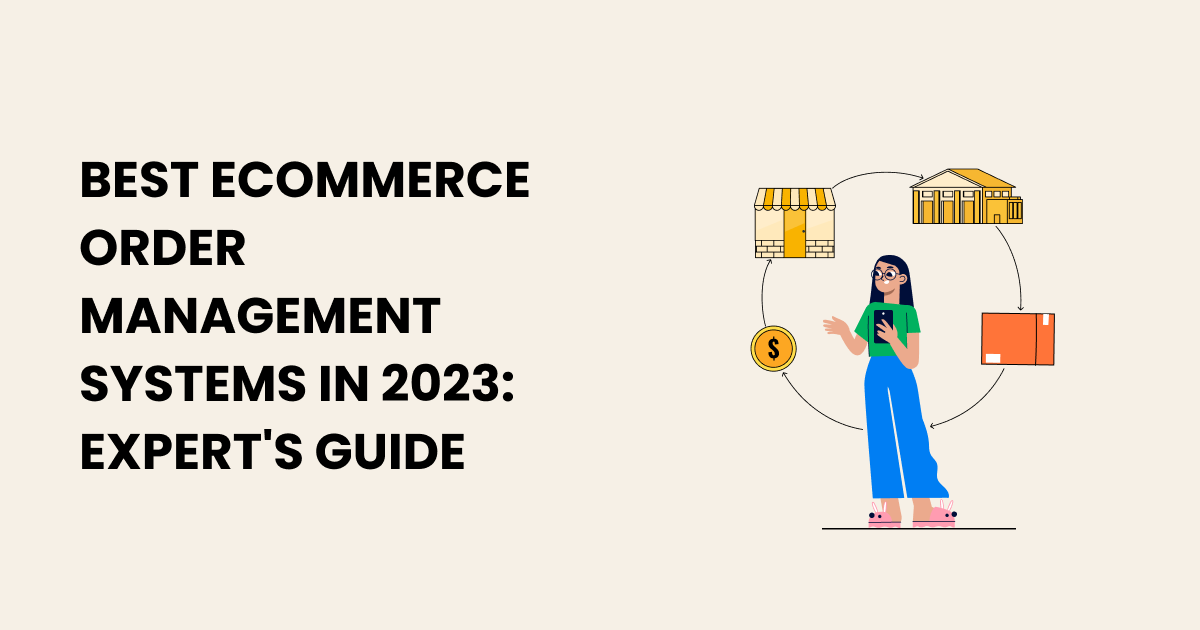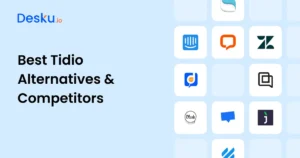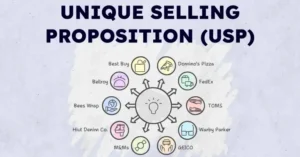The job of an eCommerce vendor doesn’t end when the customer places an order – there’s a whole list of things to be taken care of after that.
To track order history perfectly, you need a dedicated order management system for eCommerce. Now, the eCommerce order management system helps with data management for order details, supplier management, order volumes, errors in the order, order capture and validation, etc.
There are many such software vendors out there, ready to increase your confusion. Worry not, as we’ve put enough effort and funds into doing all the testing for you.
We at Desku strive to make the lives of eCommerce merchants easier; hence, we bring you this solid list of the most preferred OMS software today!
Key Takeaway :
The best ecommerce order management systems are essential for tracking order history and ensuring efficient data management for order details, supplier management, and order validation. These systems, such as Glide, IBM Sterling, QuickBooks Desktop Enterprise, and others, are designed to streamline operations, increase customer satisfaction, and support the bottom line by integrating disparate business processes.
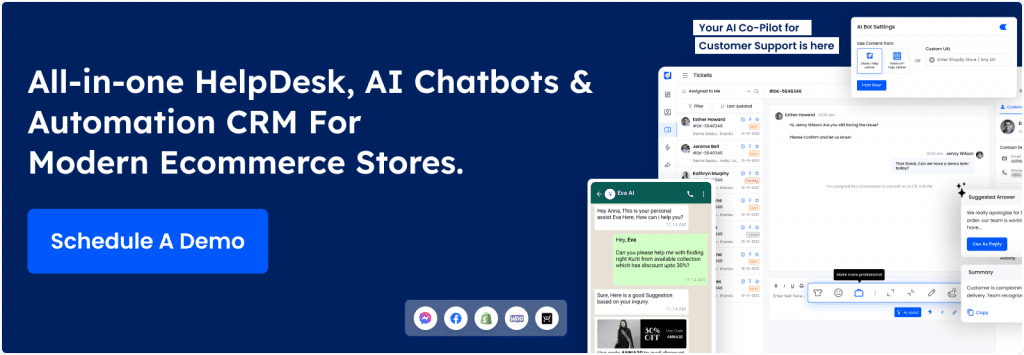
Order Management Software – What Exactly Is It?
Order Management Software (OMS) is a digital bridge between businesses, products and customers. A vivid image of the maestro who leads an orchestra comes to mind, with each instrument symbolizing some section of online sales.
From the moment a client orders to the overall fulfilment process, OMS ensures that every part plays in the symphony. The OMS fulfils what modern clients expect in terms of speed and visibility by managing and monitoring orders, supervising levels of inventory management and serializing data across sales channels.
Order Management Software is aimed at making operations easy, efficient, and effective, whether you are an e-commerce powerhouse with thousands of daily orders or a shopkeeping boutique hoping to meet demands without any hitches.
Order Management Software also supports the bottom line by increasing customer satisfaction with on-time deliveries, accurate updates, and operational efficiency gains from integrating disparate business processes.
Also read: Whose’ got the better value for money: Gorgias vs FreshDesk
Optimize E-commerce Order Management with Desku’s Comprehensive Solutions
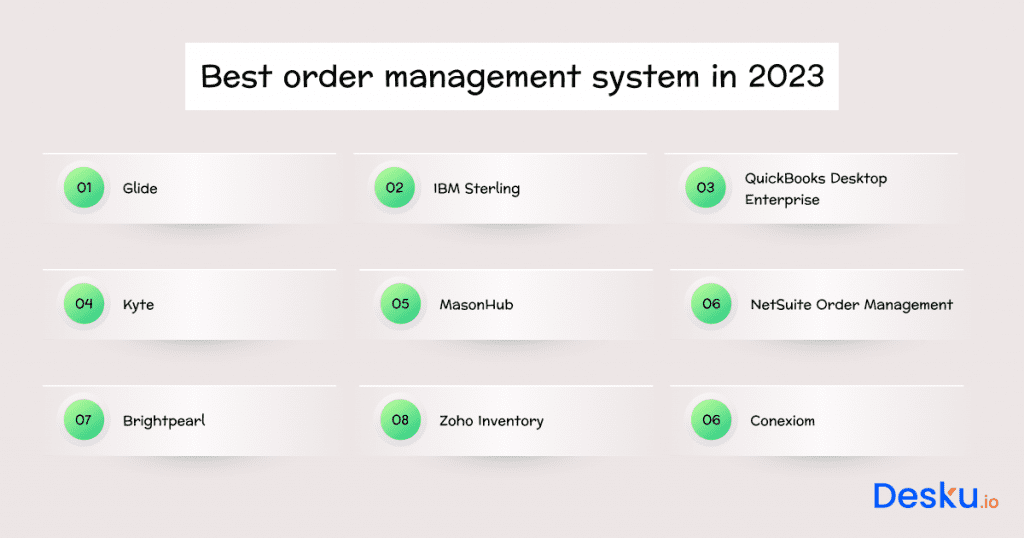
Efficient order management is the backbone of a successful e-commerce operation. However, selecting the best order management system is a critical decision for any e-commerce business. With Desku, you not only get a powerful helpdesk platform but also a comprehensive solution that integrates seamlessly with your e-commerce platform.
You’ll be able to centralize order processing with Desku’s automation in terms of customer support solutions. Also, with features such as a shared inbox, AI-powered chatbots, and a ticketing system, you won’t leave any grounds for disappointment in customer support.
Now let’s check which is the best order management system .
1). Glide: The Best Solution for Internal OMS Apps – Overall Best Order Management Software
We’ll start our list of top order management software with Glide, which is the result of several game-changing observations that reinvent the way non-technical people develop incredible apps and web apps, offering a no-code revolution in app-building. Now, imagine being able to build powerful applications without all the complications of coding. All you need is a supportive friend—your spreadsheet.
If you already use spreadsheets to manage orders, then it’s possible to couple even with Glide. Any changes done via the Glide management platform or your connected spreadsheet will be reflected in real-time across the two platforms.
Starting from ground zero? Not to worry. Glide order management system makes the order process easy for you as it helps you build your inventory management system. Glide is suitable whether you are running a retail outlet or starting from scratch.
They also have templates to assist you when starting out, while customization is simply for all. You can customize the colors, labels and buttons to match your brand in every respect.
The Glide app is not just a tool but an efficient injection into your inventory and purchase order management. By centralizing all data, you can see the entirety of your inventory, item locations, outstanding orders, or low-item alerts, making your order fulfillment process perfect and meeting business needs.
With worker profiles, order allocation, and coordination of pickers, packers, delivery drivers, and vendors up to fulfillment partners, you will take your organizational prowess a notch higher. With Glide, you can easily move across the app development world, which in turn improves the efficiency and organization of your business operations. Out of the rest of the 8 best order management tools on this list, Gide proves to be the most helpful one.
2). IBM Sterling: Best for Enterprise Digital Transformation
Introducing IBM Sterling, a powerful enterprise Order Management Software designed for omnichannel order fulfillment to step into the world of digital transformation. Meant for established companies stuck in the web of complex supply chains, IBM Sterling performs as a torch, enlightening its way on their digital transformation maze.
Essentially, IBM Sterling is a force to reckon with as it provides centralized multichannel insight into the complex web of inventory, orders and fulfillment transactions.
The platform conducts a symphony of capabilities, supporting orders in real time through monitoring, management, and automation across the enterprise around all sales channels. See the relationship as a unified procurement entity that undoes departmental barriers and provides unique coherence to your operational vista.
IBM Sterling has AI-powered alerts as one of the feathers in its cap. This brings with it enhanced decision-making prowess based on underlying artificial intelligence capability. This enables you to make better decisions when they matter most.
Furthermore, a family of configure-price-quote tools has been launched, bringing unprecedented flexibility and customization to your business processes. The platform is further enriched with supplier collaboration features, resulting in a vibrant, collaborative ecosystem.

Also read: 14 Best Landing Page builder Apps for Shopify
IBM Sterling, in essence, is more than just a platform; it is your strategic partner in the digital future. As you surf the complexities of modern business, let IBM Sterling be the wind beneath your wings to excellence and success. It’s undoubtedly a top order management partner to take care of inventory levels, order tracking, managing inventory, automating order delivery, etc., and enlightening your eCommerce business with perfection. The order management functionality is truly unquestionable.
3). QuickBooks Desktop Enterprise: Best for Integrated Accounting Software
Although best known for its accounting software, QuickBooks has been branching out, resulting in the present Quickbooks Desktop Enterprise product.
Quickbooks Desktop Enterprise is an ERP platform integrated with QuickBooks. Its management features consist of high-end accounting tools, inventory management, order routing, reporting packages, order fulfilment management (picking & shipping), timekeeping systems for labour costs tracking to ERP, and a payroll module with landed cost calculation for your online store.
QuickBooks Enterprise is perfect if you require warehouse management functionalities such as sending pick/pack requests to mobile barcode scanners. The Enterprise Diamond tier also comes with a Salesforce CRM connector.
The first major con is that most of the exciting stuff in it comes as paid add-ons, and if you don’t delve into the details very keenly during setup, your billing information will be in for some serious shocks. Their pricing begins at $1,275 annually.
It is a fantastic tool to solve problems for big entities that have many moving parts, but it is overkill for small business people. QuickBooks should be your perfect ERP solution if you run a large or highly complex operation. However, you probably don’t need the QuickBooks bells and whistles if you’re just selling on eBay or starting out on Amazon.
While we think QuickBooks has done a great job extending its capabilities, the UI design can feel a bit clunky and old-school.
4). Kyte: Best Mobile POS App
Go on a flawless retail journey with Kyte, the cutting-edge point-of-sale app with a mobile order-taking link-in. Precisely crafted, Kyte enables users to create a digital catalogue that goes beyond the ordinary, be it for sending directly to customers or blending easily with other famous social media avenues such as Facebook and Instagram.
Kyte is your watchful companion. You will receive a timely push notification for each order straight to your phone. With this real-time alert system, you can react without wasting time, thus expediting order processing like no other.
The platform allows users to take their orders from a cognitive understanding into an operational perspective through an intuitive mapping tool. Kyte turns everyday duties such as order fulfilment or filling out POs into a finely-tuned world of business symphony with several statuses for each step so “confirmed” (or being-“ready on pick-up”).
One of Kyte’s points of interest is the orders dashboard – a live interface allowing them to monitor all orders from one screen. This feature is further enhanced by several filters that enable you to drill down into different areas of your operation and make eCommerce order management a piece of cake.
Kyte is a mobile point-of-sale solution that connects businesses with their customers step by step, and it appears perfect for small businesses, such as those in the culinary domain, such as restaurants. In the busy Commerce world, Kyte is more than just an app; it’s your strategic partner to unravel the mysteries and put your business on a vibrant path of success. This inventory and order management software has got everything needed for efficient eCommerce inventory management.
Also read: Shared Mailbox vs Distribution List: Differences Worth Knowing in 2024
5). MasonHub: Best for Order Fulfillment for Beauty, Fashion, and Wellness
MasonHub is an all-inclusive order fulfilment service for eCommerce that combines inventory management, warehousing, and shipping with returns – scaling these functions in a way no one can.
Specifically, for small beauty, fashion, and wellness companies, MasonHub has been established to lead in shifting these firms from their traditional smaller-scale in-house operations into full-action arenas of wholesale and direct-to-consumer (DTC) distribution.
MasonHub embeds itself in the integration by seamlessly incorporating your business with numerous marketing channels and eCommerce tools that include heavyweights like Shopify, Netsuite, and Returnly.
As a lighthouse of control, the intuitive dashboard affords users with upfront and real-time end-to-end visibility into their entire supply chain.
Whether from a smartphone or laptop, this board has all the vital constituents within inventory particulars, order statuses, customer support hints, returns processing, etc. MasonHub turns complexity into transparency and makes it easy for small businesses to demystify the nuances of supply chain management.

6). NetSuite Order Management: Best for Multichannel Order Management
Oracle’s NetSuite for eCommerce provides the back-office functionality. It’s an enterprise resource management powerhouse developed for powerful order management to unlock multichannel sales.
At the core of NetSuite is an order management module that features a complete order lifecycle, including quote generation through to post-sale support, without traditional departmental dividers impeding from one stage to another.
This holistic tool enables detailed recordkeeping under one roof, thus simplifying various processes, including inventory consolidation, order capture & validation, order release, shipment confirmation, customer communication, and payment verification. NetSuite can also handle complex ordering situations, such as dropshipping and split shipments.
It is a sort of central location for collecting and tracking data from various fulfillment providers and locations. The approach allows for increased visibility and operational efficiencies, especially when it comes to omnichannel order fulfillment.
The company’s core platform costs include an annual license fee, optional modules, and user numbers with subscriptions. Furthermore, the initial setup fee contributes to a solid foundation of this enterprise-grade order management solution.
7). Brightpearl: Best OMS for Multichannel Retail Management
The “Retail Operating System” from Brightpearl is a transformative force. It positions itself as an all-encompassing solution, not just another ERP or standalone OMS, WMS or inventory system. It’s tailored for enterprising retail entrepreneurs and drop shippers and smoothly integrates many functionalities.
This has seen the platform enhance its operational efficiency for ambitious ventures. It harmonizes automated inventory tracking, order fulfillment, inventory allocation, shipping and accounting services.
Besides them, Brightpearl presents such innovative options as demand forecasting and CRM reports. It is also integrated with one of the best plug-and-play API partner networks. The integration prowess gives users the power to create a potent tech stack, interweaving their favorite tools without a hiccup.
With support for Shopify, Amazon, eBay, BigCommerce, Magento, and Walmart, among other eCommerce platforms, Brightpearl’s broad reach makes it an all-encompassing solution for the modern retailer.
8). Zoho Inventory: Best for Simple Setup
Zoho Inventory is a unique order management solution designed to be more user-friendly for small e-commerce businesses. Zoho Inventory emphasizes simplifying order management processes, resulting in a natural experience for those who operate through online sales.
One of Zoho’s leading strengths is its integration powers, which connect to top-notch eCommerce marketplaces such as Amazon, eBay, Etsy, and Shopify.
Under this consolidated method of approach, users can effectively handle all their online orders on one platform, promoting operational integration. Zoho Inventory also provides insights on the stock levels, thereby allowing users to set reorder points and order new stock before ending up with stockouts.
Zoho Inventory facilitates a complete order fulfillment solution by providing print shipping labels and real-time shipping rates from 30 third-party services.
By incorporating shipping data into the platform, users are provided with visibility into package delivery progress in real-time. In addition, Zoho Inventory equips users with the ability to create graphical reports for a better understanding of sales metrics to improve decision-making. Admittedly, as an order management solution for small e-commerce businesses, Zoho Inventory for eCommerce is a versatile and complete option.

9). Conexiom
Connexion Platform is a Cloud-based platform for eCommerce that digitizes and automates emailed sales orders, invoices, vendor order acknowledgments, and advanced shipping notices. Previously, manufacturers and distributors had to enter the information manually to make up for proximity; they preferred e-orders and payments.
They seek to increase all their same-day order shipment, improve the accuracy of orders and fill rates, facilitate time pay to avoid late fees, and enable them to collect discounts as well as eradicate duplicate payments or overpaying while creating invaluable additional hours.
If used more effectively, this could improve customer satisfaction, experience, growth and retention and reduce manual labor. To ensure the smooth and reliable IN-flow of this data into ERP systems, the Conexiom Platform auto-identifies emailed documents and validates complex transactional data rules to extract 100% accurate information.
Connexion has the highest touchless transaction rate in the industry, and instead of simply shifting where customers do work without requiring businesses that use their software to change their business processes or invest in expensive integrations.
In the face of lean budgets, market ES in organizations fulfills its role of generating financial benefits relatively quickly and facilitates realization concerning the speed, accuracy, and safety of transactions.
They can move toward digital and automated processing of emailed documents for increased productivity by manufacturers and distributors. It reduces dependence on labor, decreases risks, raises NPS scores with customers and credit ratings from vendors, and enhances cost control. It also strengthens operation and cash support, provides compliance and enhances profitability.
Concussion – Top Order Management Software
The Order Management System is a ship’s compass. If not, the trip in the waters of business could only be troublesome. Nevertheless, with correct order management applied, there might be an orientation towards success with growth and customer relationship management.
Finally, it is important to remember that change is instrumental in the dynamic business environment. What could be a better way to adapt than acquiring tools for foresighting challenges, barring mistakes and increasing efficiency? Here is to smarter, more unified inventory management software-led operations and a successful journey ahead.
Also, if you want to go beyond conventional solutions to streamline and enhance your entire order management process, Desku, a powerful helpdesk platform, can exceed your expectations.
